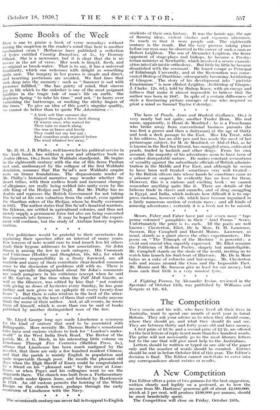Mr. H. St. J. B. Philby, well known for his
political service in the Arab lands, luis written a new and attractive book on Arabia (Bens, 18s.) from the Wahhabi standpoint. He begins in the eighteenth centurywith the rise of this fierce Puritan sect and, undismayed by the collapse of the first Wahhabi dominion, assumes that Ibn Sa'ud's new Wahhabi empire rests on firmer foundations. The dispassionate reader of Mr. Philby's historical narrative may wonder whether the desert tribes, with their endless feuds and incessant changes of allegiance, are really being welded into unity even by the able King of the Hedjaz and Nejd. But Mr. Philby has no doubts and reproves the British Government for not taking Ibn Sa'ud at his own valuation from the outset, even against the Sharifian rulers of the Hedjaz, whom he finally overcame in 1925. The author states that Ibn Sa'ud's fanatical warriors, the Ikhwan, are settled in agricultural colonies, and thus not merely supply a permanent force but also are being converted from nomads into farmers. It may be hoped that the experi- ment will continue, but the study of Arabian history inspires caution.
* * * *
























































 Previous page
Previous page